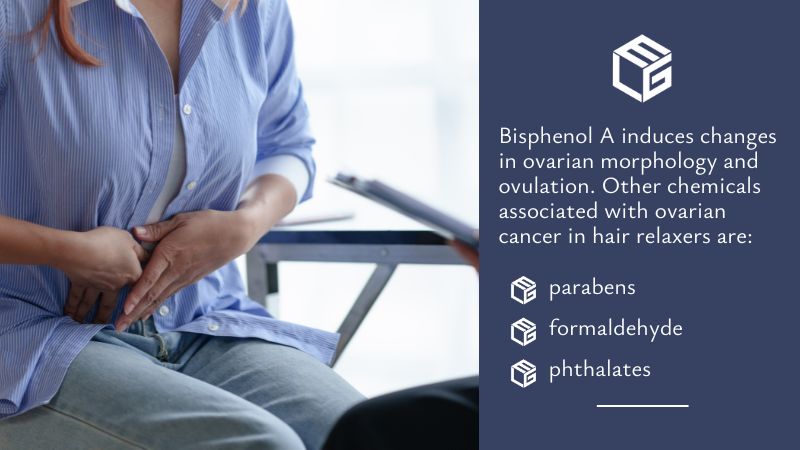Exposure to bisphenol A can induce changes in the ovarian anatomy
Bisphenol A is often present in chemical hair relaxers, and the more often a woman uses these products, the more likely she is to be exposed to it. Exposure is associated with various changes in the reproductive system in females, such as benign lesions and ovarian cysts. However, benign lesions might become cancerous over time, leading to ovarian cancer, according to a study from the medical journal Oncology Letters. If present in significant concentrations inside the body, bisphenol A can disrupt the endocrine system. The disturbances in estrogen functions bisphenol A exposure might cause are associated with the occurrence of multiple preneoplastic or neoplastic lesions in females, such as ovarian cancer. Furthermore, bisphenol A exposure can result in polycystic ovarian syndrome, which doubles ovarian cancer risk.
When ovarian cancer is caused by using toxic hair relaxers, it has a latency of 15 to 20 years or shorter. The following subtypes of ovarian cancer might deem a woman eligible to file a claim if she has been using chemical hair straightening products:
- non-serous (stronger association)
- serous tumors
Multiple studies have suggested a link between bisphenol A exposure and ovarian cancer, as the chemical mimics the effects of estrogen. Ovarian cancer cells express high levels of estrogen receptors compared with normal or benign ovarian lesion cells. In postmenopausal women, estrogens can induce a greater incidence of ovarian cancer. Since bisphenol A is endocrine-disrupting, being able to trigger the release of high estrogen levels, it has a significant association with ovarian cancer. Bisphenol A induces changes in ovarian morphology and ovulation but also a higher incidence of the following, which might increase ovarian cancer risk:
- endometriosis
- cystic endometrial hyperplasia
- proliferation lesions of the oviduct
- stromal polyps
- atypical hyperplasia
- leiomyomas or adenomyosis
Bisphenol A is the most widespread chemical compound among all endocrine-disrupting chemicals. There is substantial evidence indicating that it plays a negative role in numerous female reproductive system disorders, including ovarian cancer and conditions that increase the risk for it. Other chemicals associated with ovarian cancer lurking in hair strengthening products are parabens, formaldehyde, and phthalates. A study from Toxicological Sciences found that exposure to these chemicals might be responsible for:
- decreased hormone production
- ovarian cancer
- diminished ovarian reserve
- early pregnancy loss
While dibutyl phthalate is banned by several countries, it continues to be present in many chemical hair relaxers in the U.S. The metabolites of dibutyl phthalate can reach the ovary, and the chemical can disrupt ovarian function by targeting key pathways such as cell cycle progression. This can eventually lead to ovarian cancer. If you frequently use chemical hair relaxers and struggle with ovarian cancer, you might be entitled to financial compensation. Our skilled attorneys will help you determine whether you are eligible to file a toxic hair relaxer claim.
